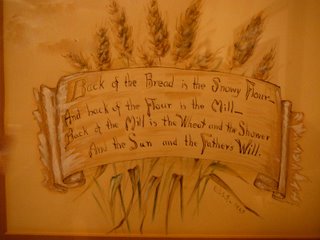
Bread on the Table—The Hermeneutics and Politics of Daily Life
On the wall of our dining area is hand watercolor painting of a table grace enshrined in my memory and the memory of my birth and marriage family that reads:
Back of the bread is the Snowy Flour—
And back of the Flour is the Mill—
Back of the Mill is the Wheat and the Shower
And the Sun and the Father’s Will.
I grew up praying it at special and ordinary meals and recall it being described as “our family grace.” I treasure the painting all the more because my grandmother painted it.
In later years I have discovered a similar version by Maltbie D. Babcock, upon which “the family prayer” is no doubt based. I do not know where the family variants “snowy” and “Sun” came from.
What has struck me for years now is the kind of naturalist and “thick” perspective on grace and blessing that this prayer expresses. Instead of the direct causality of the Bible (God giving us bread—manna dropping down in the wilderness of Exodus and John 6), there is an appreciative recognition of the layering of grace and mediation.
In the office of Morning Prayer yesterday, the reading from Hosea 2 included words with a similar layering of words of coming restoration and hope to a promiscuous, now pummeled people:
On that day I will answer, says the LORD,
I will answer the earth;
and the earth shall answer the grain, the wine and the oil,
and they shall answer Jezreel;
and I will sow myself in the land.
And I will have pity on Lo-ruhamah [“not pitied”]
and I will say to Lo-ammi [“not my people”], “You are my people”;
and he shall say, “You are my God.” (vs., 21-23, NRSV)
God speaks to the earth (what language?!) and the earth will speak to the plants and the trees and they will say, “God sows!” (the translation of Jezreel). For dramatic effect and to satisfy my enjoyment of story, I like Genesis 1: And God said, “ Let there be…” and “it was so.”
But as a sacramental people we need a mediated sense of grace—an appreciative wonder at the interrelationship of all things and of the mystery that in this web of life, the divine purpose is being fulfilled.
The Roman Catholic Eucharistic rite at the presentation of the gifts (the elements of bread and wine) presider and people pray:
Priest: Blessed are you, Lord, God of all creation. Through your goodness we have this bread to offer, which earth has given and human hands have made. It will become for us the bread of life. All: Blessed be God for ever.
Priest: Blessed are you, Lord, God of all creation. Through your goodness we have this wine to offer, fruit of the vine and work of human hands. It will become our spiritual drink.
All: Blessed be God for ever. [emphasis added]
Again we name and experience this layering and mediation of gifts. God is involved in and through it all. And, the earth and the plants and the microbes and the interaction of sun and wind and rain have been involved. And, human labor has been involved—indeed farmers, truck drivers and grocers. And, migrant laborers exposed to the dangers of border crossings and pesticides and separation from their families. (See Daniel Groody’s “Fruit of the Vine and Work of Human Hands: Immigration and the Eucharist” in Worship (Sept. 2006, Volume 80, Number 5.)
“Back of the bread” is much more than antique poetry. It is, if we are willing to look deeply and pray dangerously, a reconceiving of how intricate and costly grace is! The bread and wine of the Eucharist are cruciform—they speak of a fullness and layering of grace: the paschal mystery of Christ’s dying and rising and of the mystery of the “work” of the ecosystem and of many who risk and give their lives for the grain and grapes on our tables.
The current American politics of fear and “wallification” of our hearts and homeland pretends not to see, not to notice the layering of grace, not to appreciate how interrelated and interdependent continuing human and non-human life is.
In and through daily life—the good and the grisly—the life of God is at work calling to the earth, seeking in us to “have pity” on those “not pitied” and excluded from the feast and security we, the privileged enjoy.
Do we—will we—pray and see the layering of grace in the Eucharist and in daily life?
Daniel Benedict

Comments